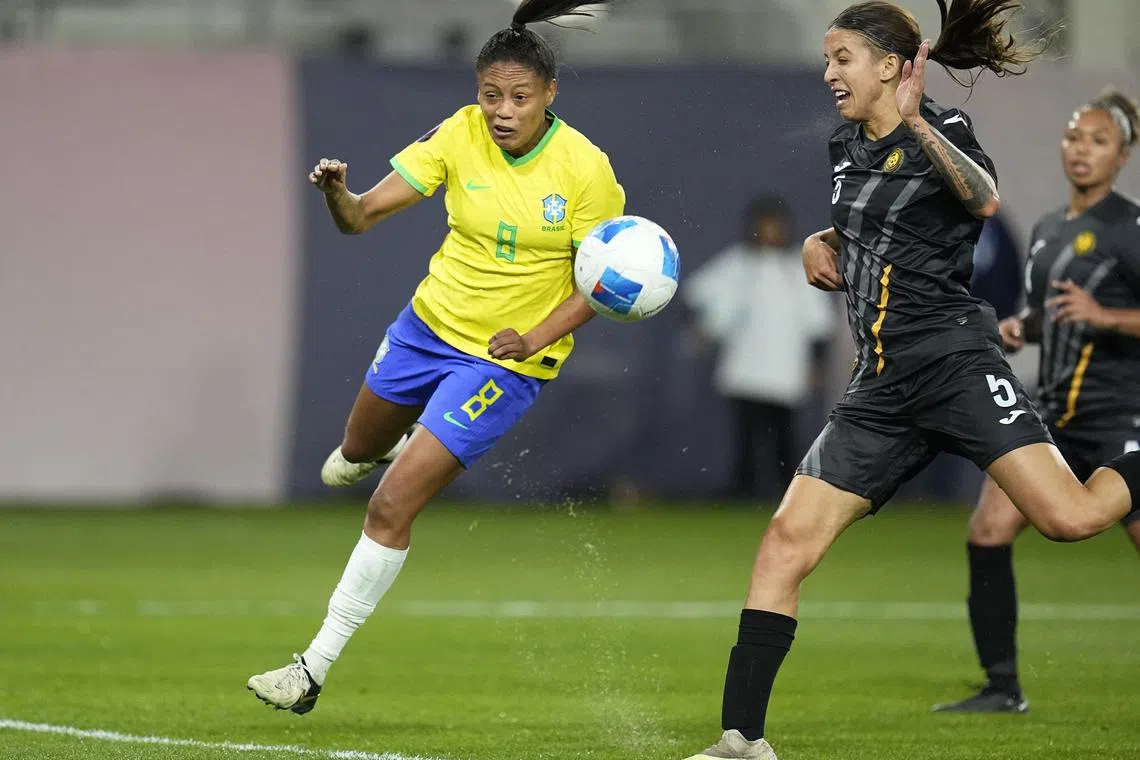Women’s Copa America highlights inequality in South American women’s football
Sign up now: Get the biggest sports news in your inbox

Brazil forward Ary Borges battles for the ball against Puerto Rico defender Madison Cox.
PHOTO: REUTERS
Follow topic:
QUITO – Intended to spotlight women’s football in South America, the 2025 Women’s Copa America in Ecuador has instead exposed deep inequalities compared with the men’s game, outraging some players and drawing unflattering comparisons with the Women’s Euro in Switzerland.
With Olympic and Pan American qualification at stake, the continent’s finest players expected professional conditions when the tournament kicked off earlier in July. However, what they found sparked widespread outrage and calls for systemic change.
The controversy erupted when images circulated on social media showing Brazil and Bolivia players warming up side-by-side in a cramped indoor space before their Group B clash, rather than on the pitch as is standard in men's competitions.
Brazil great Marta, who came out of international retirement at age 39 for the competition, led the calls for change.
“We are expected to perform well and work hard, but we also have to demand a high level of organisation,” the six-time Fifa Player of the Year told Globo Esporte.
Brazil midfielder Ary Borges delivered even sharper criticism, directly challenging Conmebol president Alejandro Dominguez.
“Even amateur matches are better organised than this. Ask Alejandro if he could warm up in a space measuring five or 10 metres and smelling of paint,” she said.
“I think we saw an example of what can be done with the men’s Copa America and its huge infrastructure. Why does the women’s tournament have to deal with this kind of thing?”
While Conmebol eventually allowed 15-minute pitch warm-ups following the backlash, the absence of video assistant referee (VAR) technology in knockout stages intensified player grievances.
Chilean forward Yanara Aedo called the lack of VAR “disrespectful” after a controversial 2-1 loss to Argentina. “VAR changes everything... Everyone could see the two penalties that weren’t awarded,” she told reporters.
“This is the Women’s Copa America, and it should be the same as the men’s tournament. The Women’s Euros are being played at the same time, so it’s disappointing for us to see this competition taking place with no VAR.”
The timing proved particularly galling, with Europe's tournament in Switzerland breaking attendance records while utilising cutting-edge technology.
Brazil’s Kerolin captured the growing discontent on social media, saying: “I’m watching the Euros today... The difference in structure, audience and investment is surreal. It’s discouraging.”
The disparities have also drawn criticism beyond South America.
Lynn Williams, the US National Women’s Soccer League’s all-time leading scorer, challenged governing bodies on Sam Mewis’ podcast The Women’s Game.
“Think about a tournament that’s happening at the same time, the Euro Cup,” she said.
“And you, as a player, are witnessing this, having a very different experience between media coverage, access to the game, and investment in the sport in these countries. Why aren’t we investing in them?”
Former United States midfielder Mewis, a Women’s World Cup winner in 2019, added: “I want to see governing bodies and people in positions of power advocating more for the players.”
The 2026 Finalissima in Los Angeles against the European champions could further highlight the inequalities. REUTERS, AFP

